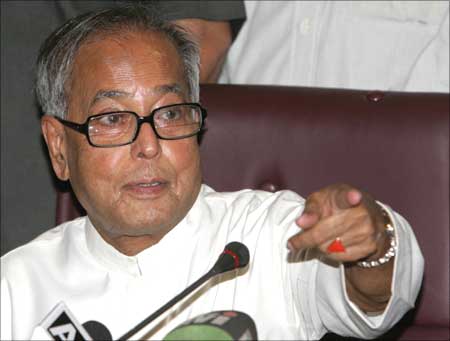
Finance Minister Pranab Mukherjee on Monday said the hike in prices of petroleum products will have some inflationary impact in the short-term but price pressures will moderate from the middle of July.
"There will be some impact (on inflation) in the short-term, but it will be absorbed in the course of time," Finance Minister Pranab Mukherjee told reporters after a meeting with bankers and chief ministers of western and central states.
To a query whether increase in inflation would prompt the Reserve Bank to raise policy rates, Mukherjee said this decision (on policy rates) is the prerogative of the central bank, which will consider all factors in its July policy review.
As inflation is already in double digits, some analysts expect the RBI to tighten monetary policy by raising policy rates. Some others, however, said the RBI may not do so before its quarterly monetary review on July 27 as the system is facing tight cash conditions due to over Rs 1 lakh crore (Rs 1 trillion) outgo on spectrum sale and advance tax payment.
The finance minister said his economic adviser has told him that there will be 0.9 per cent direct impact on inflation. Besides, there will be cascading effect, he added.
"Overall inflation pressure, particularly on food inflation, will be moderated from the middle of July and we will have a moderate rate of inflation by end of this year."
To a query, the Finance Minister said the decision to hike the fuel prices will not have any impact on fiscal deficit as the additional money does not go to the Consolidated Fund of India, but oil marketing companies.
. . .
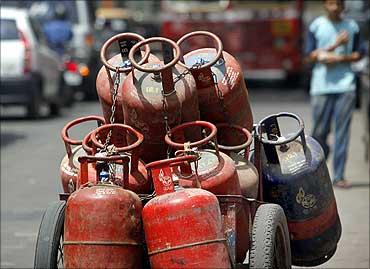
NDA allies to hold 'Bharat Bandh' against price rise in July
The National Democratic Alliance allies would hold a massive 'Bharat Bandh' in the first week of July in protest against fuel price hike.
"Besides all NDA partners, SP, PMK, JD(S), INLD, TDP and Left parties have also agreed to support the nationwide shutdown in the first week of July," JD(U) president and convenor of NDA partners Sharad Yadav said on Monday, adding that the date would be announced later this week.
"The UPA government's routine hike of petroleum products is giving hard time to common man to survive in price war of essential commodities and fuel," Yadav said.
"Just to increase GDP, the UPA government boosted automobile industry that led to hike of petrol, diesel and kerosene prices," he said.
In a politically sensitive move, the government on June 25 hiked prices of petrol by Rs 3.50 a litre and diesel by Rs 2 a litre, raised LPG by Rs 35 a cylinder and the poor man's cooking fuel kerosene by Rs 3 a litre.
Oil subsidy may be cut by Rs 25,000 crore
Credit rating agency Crisil said the government's move to decontrol petrol prices and hike the rates for cooking fuel and diesel will help public sector oil companies reduce their gross under-recoveries by Rs 25,000 crore this fiscal.
It said these steps will positively impact the financial risk profiles of oil marketing companies and gradually pave the way for economic pricing of cooking fuels.
. . .
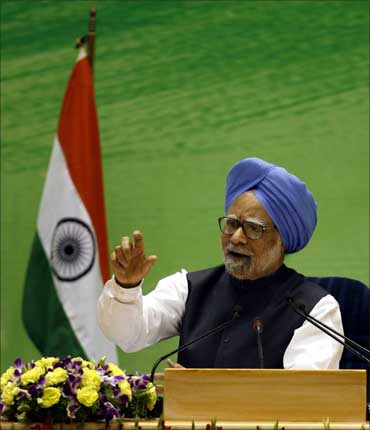
Crisil said, however, that given the sizeable under-recoveries that still exist, an institutionalised mechanism for timely sharing of subsidy will be needed.
Before the hike, the oil PSUs were projected to lose Rs 74,300 crore on selling petrol, diesel, domestic LPG and kerosene below cost in FY2010-11.
BJP seeks explanation for petro price hike
The Bharatiya Janata Party on Monday demanded an explanation from Prime Minister Manmohan Singh and UPA chairperson Sonia Gandhi for the recent increase in prices of petroleum products and announced that it would launch country-wide protests against price rise on July 1.
"BJP will observe July 1 as Mahangai Virodh Diwas across the country. Rallies will be organised in state capitals and prominent cities against price rise," party general secretary Ananth Kumar said.
He alleged that though Prime Minister Manmohan Singh had stated on the first anniversary of UPA-II that price rise is a serious issue and promised to deal with it, nothing has been done.
"We want to ask if hike in petro-product prices is an example of the kind of solutions this government is looking at to deal with this problem," he said.
BJP alleged that the first task performed by National Advisory Council headed by Gandhi was suggesting increase in prices of petroleum products.
"What is the NAC doing on price rise? Not only the prime minister but also the UPA chairperson are answerable to the nation for price rise," he said.
. . .
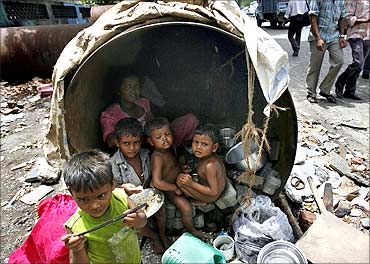
The BJP General Secretary stated that UPA had won the 2009 Lok Sabha polls with the promise of controlling prices. He said BJP president Nitin Gadkari will lead the protests on July 1 in Ratlam, Leader of Opposition in Lok Sabha Sushma Swaraj in Raipur, M Venkaiah Naidu in Chennai, Rajnath Singh in Bhubaneshwar and M M Joshi in Ranchi.
Petrol price hike to raise inflation
The freeing of government subsidised petrol prices could stoke inflation, leading to higher interest rates, global research firm Macquarie said.
"We believe the first step towards oil price deregulation is a positive step on the reform front, but increases the risk of persistent high inflation leading to faster rate hikes," Macquarie said in its 'India Strategy' report.
On Friday, the government hiked prices of petrol by Rs 3.50 a litre and diesel by Rs 2 a litre also raised LPG rates by Rs 35 a cylinder and kerosene by Rs 3 a litre.
The report said the increase in fuel and LPG prices is likely to contribute around 90 basis points to headline WPI in the month of June.
The inflation rate, as measured by the WPI, was 10.16 per cent in May, exceeding analysts' expectations, as the increase in food prices continued. It had breached the double-digit mark at 10.3 per cent in February, while peaking at 11.04 per cent in March, as per revised figures.
Macquarie said the hike in fuel prices "would likely keep the Y-o-Y inflation well above the 10.2 per cent level registered in May, unless food prices ease."
. . .
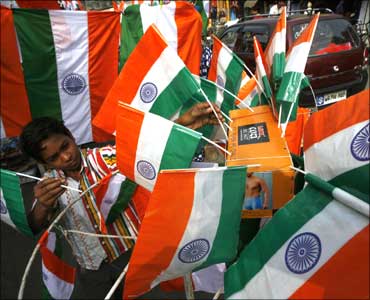
This could impact interest-rate sensitive sectors like banking, real estate and autos, it added.
The Macquarie report is in line with the estimates of Chief Economic Advisor Kaushik Basu, who had said the impact of the fuel price hike on inflation would be around 0.9 per cent.
"I expect an increase of 0.9 percentage points in the monthly WPI inflation... the impact would largely be felt in the month of July," he had said.
Global crude prices are currently hovering around $77 a barrel. The hike in fuel prices will help trim the government's huge subsidy bills, as well as relieve the oil marketing PSUs of some of their staggering burden on account of selling these fuels below market prices.
Before the price hike, state oil firms used to lose about Rs 215 crore per day on selling fuel below the imported cost. While petrol was sold at Rs 3.73 a litre below the imported price, the loss was Rs 3.80 per litre of diesel, Rs 18.82 a litre of kerosene and a discount of Rs 261.90 on every 14.2-kg cylinder of domestic LPG.
"The post-subsidy under-recoveries of the PSU oil companies stood at roughly $4 billion in FY'10 and would have possibly doubled without this price increase. All oil companies benefit from this deregulation, the benefit is tilted marginally more towards the downstream companies (IOC, HPCL and BPCL)," Macquarie said.